Growth marketing has become a buzzword in recent years, but what exactly does it mean? In this comprehensive guide, we will delve into the basics of growth marketing and explore its principles, strategies, and key components. By the end, you will have a solid understanding of growth marketing and how it can help drive business success.
| Key Element | Description | Strategies/Tips |
|---|---|---|
| Definition of Growth Marketing | Data-driven approach focusing on customer acquisition, retention, and revenue maximization. | Emphasize testing, experimentation, scalability, and sustainability. |
| Importance of Growth Marketing | Drives sustainable growth by leveraging data, insights, and a holistic approach to the customer journey. | Focus on proactive strategies, customer lifecycle, and long-term success. |
| Key Principles | Customer acquisition, retention, and revenue maximization. | Implement personalized campaigns, nurture customer relationships, and increase transaction value. |
| Growth Marketing Funnel | Awareness, consideration, and conversion stages guiding leads through the customer journey. | Utilize various tactics at each stage to attract, engage, and convert leads effectively. |
| Key Components of a Growth Marketing Strategy | Data analysis, experimentation, optimization, and cross-channel marketing. | Leverage insights for decision-making, continuously test and optimize, and use multiple channels for maximum reach. |
Understanding the concept
Definition
Growth marketing can be defined as a data-driven approach to marketing that focuses on driving customer acquisition, retention, and revenue maximization.
Unlike traditional marketing, which often relies on intuition and guesswork, growth marketing relies on testing, experimentation, and optimization techniques to achieve measurable results.
One key aspect of growth marketing is the emphasis on scalability and sustainability. Growth marketers are not just looking for quick wins. They are focused on building long-term strategies that can adapt and evolve with the changing market landscape. By constantly monitoring data and performance metrics, growth marketers can make data-driven decisions. This leads to continuous improvement and sustainable growth over time.
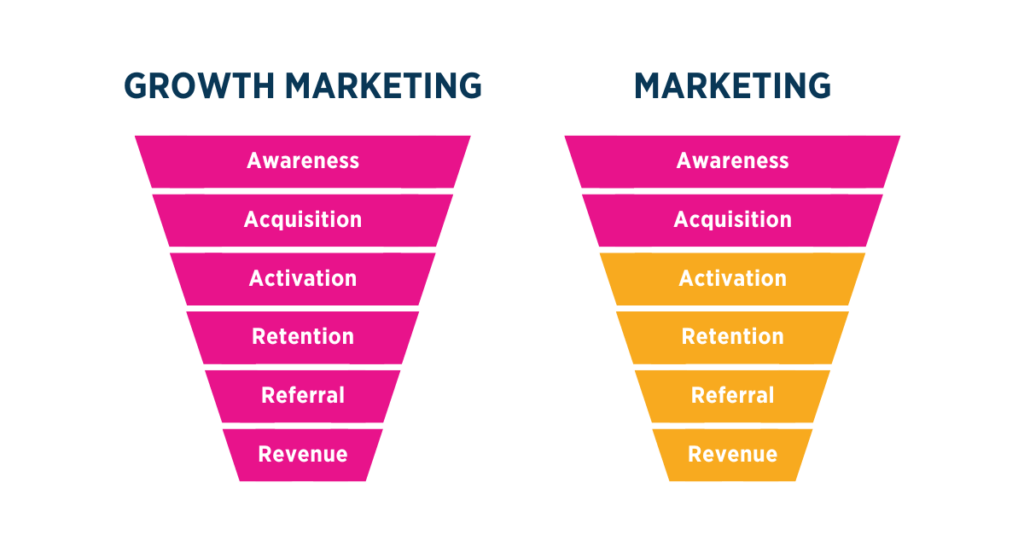
The importance of growth marketing
Growth marketing has gained popularity among businesses of all sizes due to its ability to drive sustainable growth. It allows companies to take a proactive approach to marketing, rather than relying on passive tactics. By leveraging data and insights, growth marketers can identify and capitalize on opportunities to attract and retain customers. This ultimately leads to increased revenue and market share.
Another crucial aspect of growth marketing is its focus on the entire customer journey. Unlike traditional marketing, which may only concentrate on acquiring new customers, it takes into account every stage of the customer lifecycle. This holistic approach ensures that customers not only convert but also become loyal advocates for the brand. This leads to higher customer lifetime value and lower churn rates.
Key principles
Growth marketing is a multifaceted approach that encompasses various key principles to drive business growth and success. One of the fundamental principles is customer acquisition, which plays a crucial role in expanding a company's customer base. This process involves conducting in-depth research to identify the target audience, their preferences, and pain points. By understanding the needs of potential customers, growth marketers can develop highly targeted campaigns that resonate with the audience and drive traffic to the business.
Customer acquisition
One of the key principles of growth marketing is customer acquisition. It involves identifying the target audience, understanding their needs and pain points, and creating highly targeted campaigns to attract them. Growth marketers employ various strategies. These include search engine optimization (SEO), content marketing, social media advertising, and paid search to drive traffic and convert leads into customers.
Moreover, customer acquisition is an ongoing process that requires continuous optimization and adaptation to stay relevant in a competitive market. Growth marketers constantly analyze data and metrics to refine their strategies and ensure maximum effectiveness in acquiring new customers.
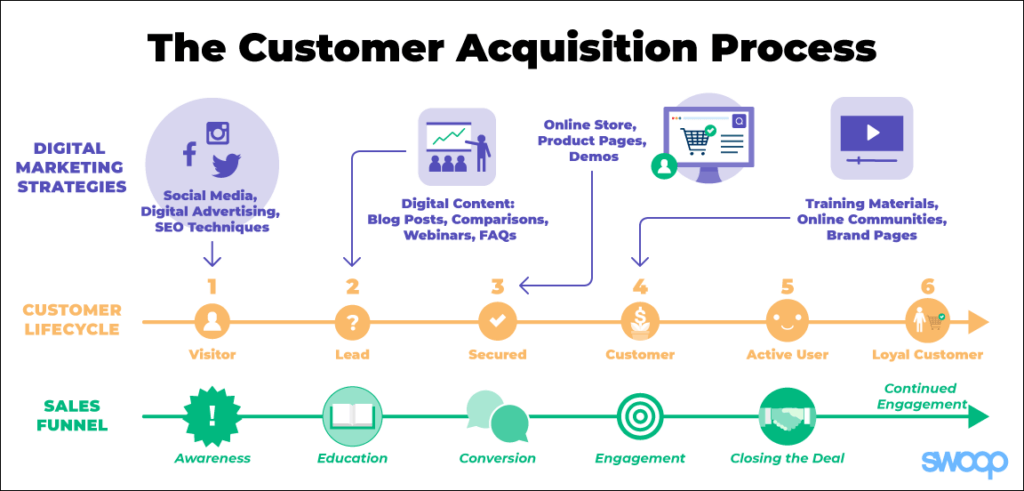
(Source: Swoop)
Customer retention
Another critical principle is customer retention, which focuses on nurturing existing customer relationships to drive repeat business and foster brand loyalty. By implementing personalized email marketing campaigns, creating customer loyalty programs, and providing exceptional customer service, growth marketers aim to keep customers engaged and satisfied.
Customer retention is essential for long-term business success. Loyal customers are more likely to make repeat purchases and act as brand advocates, contributing to organic growth through word-of-mouth referrals.
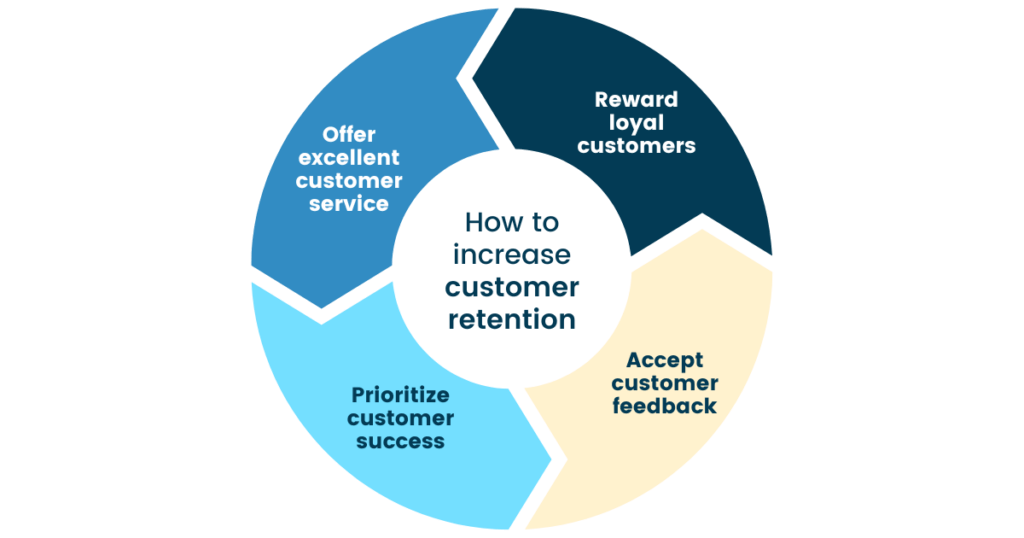
Revenue maximization
The final principle of growth marketing is revenue maximization. This involves finding innovative ways to increase the average transaction value and customer lifetime value. Growth marketers achieve this by implementing upselling and cross-selling techniques, creating compelling upsell offers, and nurturing customer relationships to encourage additional purchases over time.
By focusing on revenue maximization, businesses can not only increase their profitability but also build stronger customer relationships and drive sustainable growth in the long run.
The growth marketing funnel
The growth marketing funnel is a strategic framework. It guides businesses through the process of turning potential customers into loyal brand advocates. It consists of three key stages: awareness, consideration, and conversion. Each stage plays a crucial role in attracting, nurturing, and converting leads effectively.
Awareness stage
During the awareness stage, the primary objective is to increase brand visibility and capture the attention of the target audience. Growth marketers leverage a variety of tactics. These include content marketing, social media campaigns, and influencer partnerships to create a buzz around the brand. By crafting compelling stories and engaging with potential customers on different platforms, businesses can establish a strong presence in the market.
Furthermore, in the digital age, search engine optimization (SEO) plays a vital role in boosting brand awareness. By optimizing website content and implementing relevant keywords, businesses can improve their online visibility and attract organic traffic. Engaging blog posts, informative videos, and visually appealing infographics are also effective tools for capturing the interest of potential customers.
Consideration stage
As leads progress to the consideration stage, the focus shifts towards building relationships and providing valuable information to guide their decision-making process. Growth marketers utilize strategies such as email marketing, remarketing ads, and personalized content to stay connected with leads and address their specific needs. By offering tailored solutions and addressing any concerns or objections, businesses can build trust and credibility with potential customers.
Moreover, social proof and customer testimonials play a significant role in influencing purchase decisions during the consideration stage. By showcasing positive reviews and success stories, businesses can instill confidence in leads and demonstrate the value of their products or services. Creating interactive experiences, hosting webinars, and offering free consultations are also effective ways to engage with leads and encourage them to take the next step.
Conversion stage
Once leads reach the conversion stage, the ultimate goal is to turn them into paying customers. Growth marketers focus on optimizing the conversion process by streamlining the user experience, eliminating any barriers to purchase, and providing compelling incentives. Limited-time promotions, exclusive discounts, and free trials are common tactics used to encourage conversions and drive revenue for the business.
Additionally, implementing user-friendly checkout processes, offering multiple payment options, and providing excellent customer support are essential elements in facilitating a smooth transition from lead to customer. By delivering a seamless and personalized experience, businesses can increase conversion rates and foster long-term relationships with their customers.
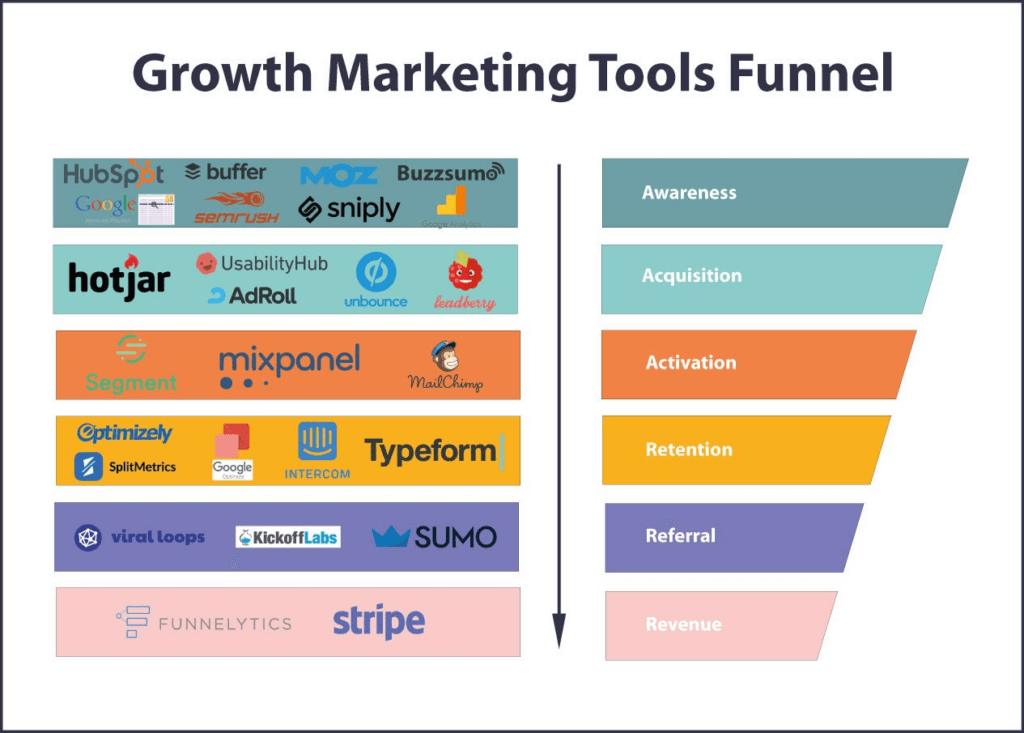
(Source: Medium)
Key components of a growth marketing strategy
Data analysis and insights
Data analysis is a fundamental component of a growth marketing strategy. Growth marketers gather and analyze data to gain insights into customer behavior, identify trends, and make data-driven decisions. With the help of tools like Google Analytics, CRM systems, and market research, growth marketers uncover valuable insights that guide their marketing efforts.
Experimentation and optimization
Growth marketing thrives on experimentation and optimization. Growth marketers continuously test different strategies, channels, and tactics to identify what works best for their target audience. They monitor key performance indicators (KPIs) and use A/B testing, heat mapping, and conversion rate optimization techniques to optimize their campaigns and improve results over time.
Cross-channel marketing
Effective growth marketing involves implementing a cross-channel marketing approach. Growth marketers leverage multiple channels. These include social media, email marketing, search engine marketing (SEM), and content marketing to reach their target audience at different touchpoints. This multi-channel strategy allows them to maximize reach, engage with customers across various platforms, and create a cohesive brand experience.

Conclusion
In conclusion, growth marketing is a data-driven approach to marketing that focuses on driving customer acquisition, retention, and revenue maximization. By understanding the principles of growth marketing, utilizing the growth marketing funnel, and incorporating key components into their strategies, businesses can achieve sustainable growth and stay ahead in today's competitive landscape. Embrace growth marketing as a comprehensive strategy to take your business to new heights.
Unlock exponential growth with Cello
Ready to transform your users into a powerful growth engine for your SaaS product? Cello offers the simplest solution to launch a peer-to-peer referral program, designed to integrate seamlessly and get up and running in just hours. Experience the thrill of viral growth with a user-friendly sharing experience that rewards your customers and drives conversions. With minimal development time, immediate payback, and impressive conversion rates, Cello is the growth partner you need to scale effortlessly. Don't just take our word for it; see how tl;dv skyrocketed their monthly referral signups using Cello. Take the first step towards user-led growth and book a demo to see Cello in action today.
Resources
Related Articles

7 Best B2B Referral Software (2025 Guide)
Which referral software should I choose? In the world of referral marketing, choosing the right ...

Scaling and Maintaining a B2B User Referral Program
Learn how to set the right incentives for B2B SaaS user referral programs
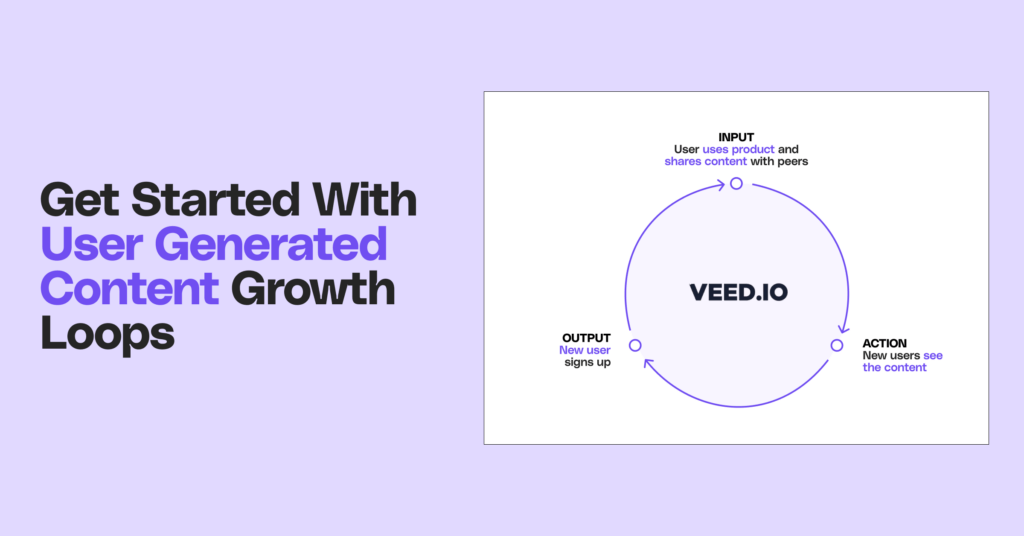
What are User Generated Content Growth Loops?
User Generated Growth (UGC) loop is a growth engine where users create content that attracts ...

